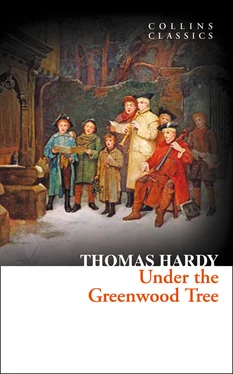The tranter looked a long time before he replied, “I fancy she will; and yet I fancy she won’t.”
Dick implied that such a remark was rather to be tolerated than admired; though deliberateness in speech was known to have, as a rule, more to do with the machinery of the tranter’s throat than with the matter enunciated.
They made preparations for going to church as usual; Dick with extreme alacrity, though he would not definitely consider why he was so religious. His wonderful nicety in brushing and cleaning his best light boots had features which elevated it to the rank of an art. Every particle and speck of last week’s mud was scraped and brushed from toe and heel; new blacking from the packet was carefully mixed and made use of, regardless of expense. A coat was laid on and polished; then another coat for increased blackness; and lastly a third, to give the perfect and mirror-like jet which the hoped-for encounter demanded.
It being Christmas-day, the tranter prepared himself with Sunday particularity. Loud sousing and snorting noises were heard to proceed from a tub in the back quarters of the dwelling, proclaiming that he was there performing his great Sunday wash, lasting half-an-hour, to which his washings on working-day mornings were mere flashes in the pan. Vanishing into the outhouse with a large brown towel, and the above-named bubblings and snortings being carried on for about twenty minutes, the tranter would appear round the edge of the door, smelling like a summer fog, and looking as if he had just narrowly escaped a watery grave with the loss of much of his clothes, having since been weeping bitterly till his eyes were red; a crystal drop of water hanging ornamentally at the bottom of each ear, one at the tip of his nose, and others in the form of spangles about his hair.
After a great deal of crunching upon the sanded stone floor by the feet of father, son, and grandson as they moved to and fro in these preparations, the bass-viol and fiddles were taken from their nook, and the strings examined and screwed a little above concert-pitch, that they might keep their tone when the service began, to obviate the awkward contingency of having to retune them at the back of the gallery during a cough, sneeze, or amen—an inconvenience which had been known to arise in damp wintry weather.
The three left the door and paced down Mellstock lane and across the ewe-lease, bearing under their arms the instruments in faded green-baize bags, and old brown music-books in their hands; Dick continually finding himself in advance of the other two, and the tranter moving on with toes turned outwards to an enormous angle.
At the foot of an incline the church became visible through the north gate, or “church hatch,” as it was called here. Seven agile figures in a clump were observable beyond, which proved to be the choristers waiting; sitting on an altar-tomb to pass the time, and letting their heels dangle against it. The musicians being now in sight, the youthful party scampered off and rattled up the old wooden stairs of the gallery like a regiment of cavalry; the other boys of the parish waiting outside and observing birds, cats, and other creatures till the vicar entered, when they suddenly subsided into sober church-goers, and passed down the aisle with echoing heels.
The gallery of Mellstock Church had a status and sentiment of its own. A stranger there was regarded with a feeling altogether differing from that of the congregation below towards him. Banished from the nave as an intruder whom no originality could make interesting, he was received above as a curiosity that no unfitness could render dull. The gallery, too, looked down upon and knew the habits of the nave to its remotest peculiarity, and had an extensive stock of exclusive information about it; whilst the nave knew nothing of the gallery folk, as gallery folk, beyond their loud-sounding minims and chest notes. Such topics as that the clerk was always chewing tobacco except at the moment of crying amen; that he had a dust-hole in his pew; that during the sermon certain young daughters of the village had left off caring to read anything so mild as the marriage service for some years, and now regularly studied the one which chronologically follows it; that a pair of lovers touched fingers through a knot-hole between their pews in the manner ordained by their great exemplars, Pyramus and Thisbe; that Mrs Ledlow, the farmer’s wife, counted her money and reckoned her week’s marketing expenses during the first lesson—all news to those below—were stale subjects here.
Old William sat in the centre of the front row, his violoncello between his knees and two singers on each hand. Behind him, on the left, came the treble singers and Dick; and on the right the tranter and the tenors. Farther back was old Mail with the altos and supernumeraries.
But before they had taken their places, and whilst they were standing in a circle at the back of the gallery practising a psalm or two, Dick cast his eyes over his grandfather’s shoulder, and saw the vision of the past night enter the porch-door as methodically as if she had never been a vision at all. A new atmosphere seemed suddenly to be puffed into the ancient edifice by her movement, which made Dick’s body and soul tingle with novel sensations. Directed by Shiner, the churchwarden, she proceeded to the small aisle on the north side of the chancel, a spot now allotted to a throng of Sunday school girls, and distinctly visible from the gallery front by looking under the curve of the furthermost arch on that side.
Before this moment the church had seemed comparatively empty—now it was thronged; and as Miss Fancy rose from her knees and looked around her for a permanent place in which to deposit herself—finally choosing the remotest corner—Dick began to breathe more freely the warm new air she had brought with her; to feel rushings of blood, and to have impressions that there was a tie between her and himself visible to all the congregation.
Ever afterwards the young man could recollect individually each part of the service of that bright Christmas morning, and the trifling occurrences which took place as its minutes slowly drew along; the duties of that day dividing themselves by a complete line from the services of other times. The tunes they that morning essayed remained with him for years, apart from all others; also the text; also the appearance of the layer of dust upon the capitals of the piers; that the holly-bough in the chancel archway was hung a little out of the centre—all the ideas, in short, that creep into the mind when reason is only exercising its lowest activity through the eye.
By chance or by fate, another young man who attended Mellstock Church on that Christmas morning had towards the end of the service the same instinctive perception of an interesting presence, in the shape of the same bright maiden, though his emotion reached a far less developed stage. And there was this difference, too, that the person in question was surprised at his condition, and sedulously endeavoured to reduce himself to his normal state of mind. He was the young vicar, Mr Maybold.
The music on Christmas mornings was frequently below the standard of church-performances at other times. The boys were sleepy from the heavy exertions of the night; the men were slightly wearied; and now, in addition to these constant reasons, there was a dampness in the atmosphere that still further aggravated the evil. Their strings, from the recent long exposure to the night air, rose whole semitones, and snapped with a loud twang at the most silent moment; which necessitated more retiring than ever to the back of the gallery, and made the gallery throats quite husky with the quantity of coughing and hemming required for tuning in. The vicar looked cross.
When the singing was in progress there was suddenly discovered to be a strong and shrill reinforcement from some point, ultimately found to be the school-girls’ aisle. At every attempt it grew bolder and more distinct. At the third time of singing, these intrusive feminine voices were as mighty as those of the regular singers; in fact, the flood of sound from this quarter assumed such an individuality, that it had a time, a key, almost a tune of its own, surging upwards when the gallery plunged downwards, and the reverse.
Читать дальше












